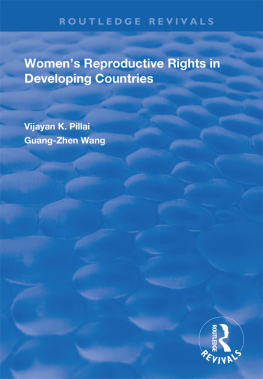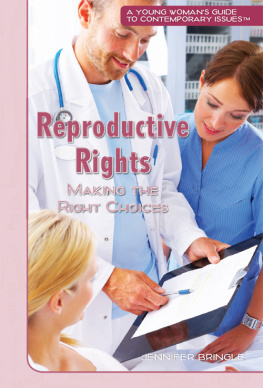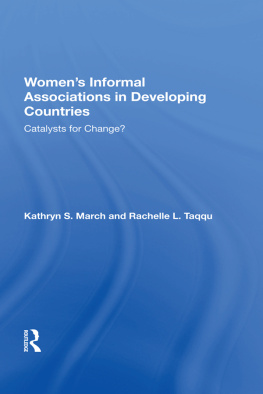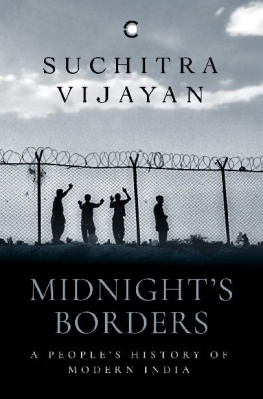WOMEN'S REPRODUCTIVE RIGHTS IN DEVELOPING COUNTRIES
TO
My late father C. K. Unnikrishna Pillai, my mother Chandramathi, and my late sister Indira Menon.
My father Wang Zhi-liang, my mother Zhou Yu-hua, and sister Guang-lan who did not live to see this book
Womens Reproductive Rights in Developing Countries
Vijayan K. Pillai
University of North Texas
Guang-Zhen Wang
University of Arkansas at Little Rock
First published 1999 by Ashgate Publishing
Reissued 2018 by Routledge
2 Park Square, Milton Park, Abingdon, Oxon OX14 4RN
52 Vanderbilt Avenue, New York, NY 10017
Routledge is an imprint of the Taylor & Francis Group, an informa business
Copyright Vijayan K. Pillai and Guang-zhen Wang 1999
All rights reserved. No part of this book may be reprinted or reproduced or utilised in any form or by any electronic, mechanical, or other means, now known or hereafter invented, including photocopying and recording, or in any information storage or retrieval system, without permission in writing from the publishers.
Notice:
Product or corporate names may be trademarks or registered trademarks, and are used only for identification and explanation without intent to infringe.
Publishers Note
The publisher has gone to great lengths to ensure the quality of this reprint but points out that some imperfections in the original copies may be apparent.
Disclaimer
The publisher has made every effort to trace copyright holders and welcomes correspondence from those they have been unable to contact.
A Library of Congress record exists under LC control number: 99072243
ISBN 13: 978-1-138-35918-5 (hbk)
ISBN 13: 978-0-429-43382-5 (ebk)
Reproductive rights and population control are among the most controversial and sensitive issues of the twentieth century. The focus on reproductive rights in the recent years, we argue, emerges from three distinct sources. They are the long standing human rights tradition rooted in Western values, worldwide population control programs, and the reproductive health movement. Human rights activists have brought to the attention of the world community gender specific risks such as domestic violence against women. Mounting accusations of coercive birth control practices brought about a political backlash and a renewed interest in voluntary fertility as a broad-based ethical foundation for population control programs. International reproductive health movements in the late 1970s and early 1980s criticized family planning programs especially in developing countries for focusing on achieving quantitative goals and neglecting women's reproductive health. Finally, it is now well recognized by medical and public health professionals that reproductive rights are necessary for improving women's reproductive health.
This book presents an empirical model of reproductive rights in developing countries. The model encompasses three explanations of reproductive rights. The first explanation proposes that reproductive rights levels are negatively related to population growth. The second explanation argues that gender equality has a positive effect on reproductive rights. Finally we propose that women's education has a positive effect on reproductive rights. The empirical model takes into account the effects of modernization, secularization, and family planning program effort on population growth, women's education, and gender equality.
The idea that as men and women share power and resources equally, women are more likely to enjoy reproductive rights has for long been the cornerstone of development programs targeted at women. This is also the theoretical basis for the current popularity of women's empowerment programs as a strategy to improve the quality of life among women. Programs, activities, and policies to increase women's reproductive rights are well ahead of empirical research in the area of reproductive rights. This book contributes to empirical reproductive rights research.
Data on one hundred and one developing countries are analyzed using structural equation analysis. Our research findings suggest that value-based structural changes play an important role in improving reproductive rights. The question is, how do we change values. We offer suggestions based on our findings and a few speculations. We have suggested a number of policy directives based on our findings using cross-national data. This study provides a direction for empirical research in the area of reproductive rights.
We wish to express our thanks to Fred Pampel at the University of Colorado Boulder; Joseph Chamie at the United Nations; Cora Martin at the University of North Texas; Lyle Shannon at the University of Iowa; Jay Weinstein at the Eastern Michigan State University; Elizabeth Esterchild at the University of North Texas; Satoshi Kanozawa at the University of Illinois at Urbana; and Paulina Khumba at Wiley College for their constructive comments. We are highly indebted to the Department of Sociology at the University of North Texas and the Department of Sociology and Anthropology at the University of Arkansas at Little Rock for their support. We are deeply indebted to Felicia LeClare at the University of Notre Dame who provided us with extensive commentaries on an earlier version of this book. We would like to extend our thanks to graduate assistant, T.S. Sunil, for his competent assistance throughout the course of this project. This book incorporates several key findings from articles which are to appear in Social Science Journal, Michigan Sociological Review, International Journal of Comparative Sociology, and Canadian Journal of Sociology. We thank the publishers of these journals for giving us permission to use substantive material from our articles.
Perhaps one of the most publicized political and social issues of this decade is the issue of women's reproductive rights. A number of social and political phenomena have played a catalytic role in the emergence and current visibility of women's reproductive rights. The most noteworthy among them is the political prominence of humans rights groups and organizations. Since the establishment of the U.N. Commission on the Status of Women (CSW) in 1946, the international community has adopted treaties and recommendations to promote women's rights in political, economic, civil, and social fields. It was not until the recent decades that the right to make reproductive decisions was recognized as a fundamental human right. The population control movements in some developing countries have contributed to the current visibility of women's reproductive rights as a social issue. Reproductive rights include the rights such as the right to decide on the starting, spacing, and stopping of fertility. The basic right to decide on the spacing and number of children may not be taken for granted universally even today. The control over resources to make these reproductive decisions is a key aspect of reproductive rights.
The population control movement is characterized by an emphasis on achieving demographic targets. These targets are often aimed at an improvement in two quantifiable ends: the number of potential births averted and the number of contraceptive users. The strategies for achieving these targets in some developing countries have resulted in numerous violations of women's individual rights and have compromised women's health (Correa, 1994). Family planning programs in Puerto Rico between 1950 and 1970 sterilized without their knowledge a large number of poor women who could not afford private medical care. Mass protests from women against this program led to its abandonment (Correa, 1994).








